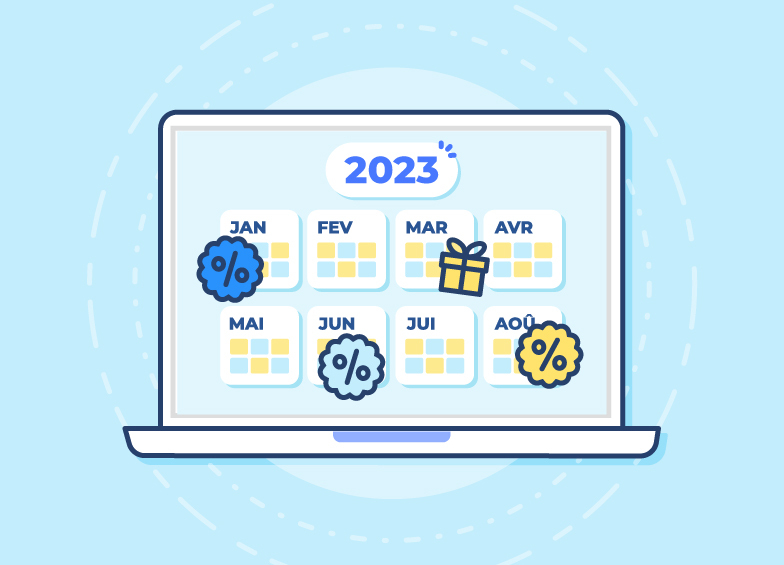How to integrate promotion into your CRM strategy in 2023?



Nathalie Remi-Beauce
Category: CRM strategy
Barely out of two complicated years linked to the health context, retail players are now faced with inflation. According to Fevadrising prices are upsetting consumer habits, and customers are being forced to make trade-offs.
So will your customers buy more for less, or less for more in 2023? In these difficult economic times, the equation for retailers to solve is not an easy one!
Is price the only way to convert to purchase and keep your CRM growing? It's high time to get away from preconceived ideas and use promotions not as a one-off means of mass destocking and generating immediate sales, but as a genuine growth lever in your overall marketing strategy.
Today's CRM teams need to think about a new approach to their promotional strategy, one that respects a balance between sales and margins over the whole year, and no longer concentrates on a few dates (which, incidentally, are the same for everyone).
In a context of inflation, brands tend to expect a lot from the big sales operations such as sales, Private Sales and Black Fridayeven more so if there are large stocks of unsold products.
However, they need to take into account changes in consumer behavior linked to this decline in purchasing power. Indeed, even if the vast majority of consumers took advantage of the big discounts on Black Friday in 2022, we can see that for some this was part of a more considered and less impulsive approach: firstly, the cumulative amount of their purchases was lower than in previous years, but above all many took the opportunity to prepare their Christmas presents, which means that the sales usually generated per customer in December were impacted downwards.
So should we continue to rely on these one-off promotional events? How can we maintain or even increase overall sales over the year if each of these operations is less effective? We urgently need to get back to the basics of customer marketing, and take into account a key growth parameter: customer retention and its long-term value.
Today's marketing plans live to the rhythm of promotional and non-promotional "chestnuts " (Christmas, Valentine's Day, etc.). They are the subject of one-shot campaigns, often poorly personalized and sent out to the entire database. But are they really relevant to all your customers?
Of course, the question is not to call into question the need to speak out at these key moments, but rather to determine how they fit into an overall marketing strategy.
CRM managers must no longer think in terms of individual operations. He or she must set objectives for the year, and use these campaigns as levers that can be activated or not, depending on the customer's needs and expectations, since failure to take these into account often runs counter to the desired effect (causing annoyance or even disengagement).
For example, a promotion-aware customer will undoubtedly receive offers for large-scale stock clearance operations such as Black Friday. On the other hand, a customer who never buys on promotion will be informed, but may be targeted more for Christmas operations, which feature a selection and recommendations of seasonal products.
Of course, better targeting your customers according to their expectations will have an impact on costs and improve the operation's margin, but will it be enough to achieve your annual objectives? The answer is obviously no! In fact, talking to your customers at times when they're over-solicited won't necessarily encourage the creation or maintenance of a special relationship with each and every one of them. To really engage customers, you need to create regular interactions with them, and above all, they need to be hyper-personalized.
Building your marketing plan around the customer's interests is therefore becoming an essential paradigm shift.
A promophile customer will probably be interested in sales, private sales and Black Friday, but should we wait for these scheduled events to talk to them? Why not plan promotions for the rest of the year, not on the entire catalog, but on selected products? This would allow us tomaintain a close relationship with our customers, by personalizing the message with an offer and products that correspond to their needs.
As we can see, more and more brands are already aware of the need to destock as they go along, by offering permanent discounts, particularly on their e-commerce sites (in "soft price" or "outlet" sections, etc.). These discounts are often smaller than during sales (which limits the impact on margins), but they are still attractive to promophile profiles, and can form the focus of a new customer acquisition strategy.
By multiplying targeted offers to customers who are sensitive to the promotion, apart from large one-off operations, the benefits for brands will be twofold: on the one hand, it ensures a regular relationship with customers, and on the other, they will be more receptive to a personalized offer at a time when they are less solicited by competing brands. As a result, the conversion rate will be higher, and additional sales will be generated.
All brands use promotions at the same times of the year to massively de-stock and make way for new collections. But in difficult times, despite substantial discounts, average customer baskets are often lower. The business objectives of these operations are therefore more difficult to achieve, both in terms of sales and inventory management.
CRM managers need to reconsider their overall CRM plan in order to "make up" for the drop in results from promotional highlights: they need to be able to activate operations, alternating with these highlights, that meet the brand's challenges (sales and destocking) and the expectations of promotion-sensitive customers (looking for the right deal, but also recognition of their status).
These personalized communications, disconnected from "generic" appointments, will help to improve customer relations and, ultimately, retention and individual sales.
By relying on operations available throughout the year, marketing teams will be able to steer and readjust their customer marketing more serenely, avoiding betting everything on a few short periods. Promotion becomes a growth lever available to CRM managers, which can be activated "on demand" in the marketing strategy: it enables them to increase the additional sales of promophile customers by offering them communications targeted according to their product appetence, but also according to their life cycle (welcome offer, reward for a loyal customer, anti-churn measure...).
The customer feels recognized and respected and the growth of the CRM is preserved.
Contents